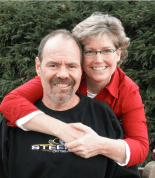The Challenge: Congestive Heart Failure
It was during hunting season in 1985 when Bob Shoup, then 27, started experiencing fatigue and shortness of breath. He also was suffering from what he thought was a cold at the time. When his cough did not subside after a few weeks, he went to see his local doctor who told him he had bronchitis.
A few days before Christmas, Bob’s arm went numb, and he couldn’t speak — signs of a stroke. He went back to his doctor, who gave him additional medication for bronchitis. Several weeks passed and Bob still had no energy, he couldn’t walk across the room without loss of breath.
Bob went for a second opinion, and doctors performed a chest x-ray. The results showed that Bob’s heart was severely enlarged due to congestive heart failure.
The Solution: Heart Transplant Surgery
Bob was admitted to UPMC Presbyterian in January 1986 for initial testing. He was allowed to return home for a few days, and by the time he returned, his doctors confirmed that he was on the heart transplant waiting list. Bob was 27 years old at the time.
“It was a scary feeling,” says Bob. “I was the youngest transplant patient on the floor, but the nurses made me feel comfortable and I was very confident in my UPMC doctors.”
Bob spent three months on the heart transplant waiting list. He received his new heart on March 12, 1986.
He spent three weeks in the hospital after his transplant. Just days after returning home, he was able to resume normal activity. He went fishing, played softball with friends, and returned to work in January 1987.
The Results: Second Heart Transplant and Living-Donor Kidney Transplant
Fifteen years later in 2001, Bob began experiencing recurring symptoms of fatigue and shortness of breath. He immediately went to see his doctor. Tests revealed that his arteries were completely blocked. Doctors gave Bob three to six months to live unless he received a new heart.
Bob’s heart was failing because the antirejection medications available at the time of Bob’s first transplant were not as advanced as the medications available today, and the life expectancy of transplant patients was not as high as it is today. Bob was listed in April, and in October 2001, Bob returned to UPMC to undergo a second heart transplantation.
Bob suffered some setbacks which prolonged his recovery, but he was able to return to normal activities after about two months. He remained healthy until the fall of 2003 when his doctors referred him to UPMC kidney specialists after reviewing results of a routine blood test. Bob began dialysis in October of 2003.
Aware that he may need a kidney transplant, Bob asked his brother if he would be willing to be a donor. After going through all the necessary tests, Bob’s brother was a match. He underwent a kidney transplant in February 2004, began working out two weeks after transplant, and returned to work five months later.
Over 25 years have passed since his initial heart transplant, and Bob has been able to lead a primarily healthy, normal life, and watch his family grow—something he wasn’t always sure would be possible.
“At that time, no one thought living 20 or more years post-transplant was a possibility. My kids were three and four at the time of my first transplantation, so the initial goal was to see my children reach kindergarten. Then a few years went by, and the goal was to see my wife complete college. After that, it was to coach my children’s sports teams, and then see them graduate high school. Today, my children are in their early thirties. I was able to watch my family grow up through transplantation.”
“My family grew up with transplantation, they don’t know anything different. We’ve never treated it as a hindrance.”
He says he has no fear of any health-related problems because he knows that if he needs anything, he can make one call and everything will be taken care of.
“I wouldn’t want to go anywhere else,” he says. “The UPMC doctors, nurses, and staff all know me. They are a part of my UPMC family.”
In 2012, Bob was able to travel to Arizona and spend the holidays with his first grandson.
“You can’t put a price on that,” he says. “It’s priceless knowing that the people taking care of you know you, and care about you, and to have the comfort of knowing that you’re being taken care of by the best.”
Bob's treatment and results may not be representative of similar cases.
Read more heart transplant patient stories
Learn More About Heart Failure and Heart Health
UPMC HealthBeat Blog:
UPMC Transplant Services:

















